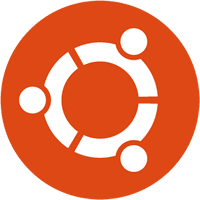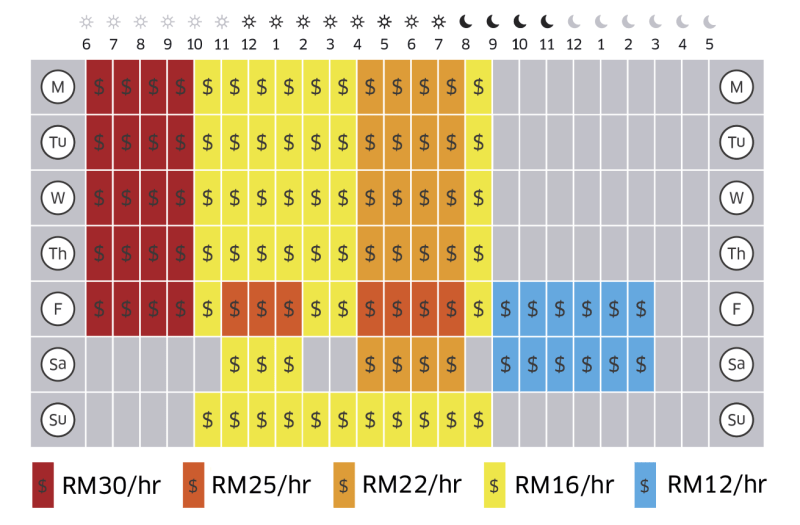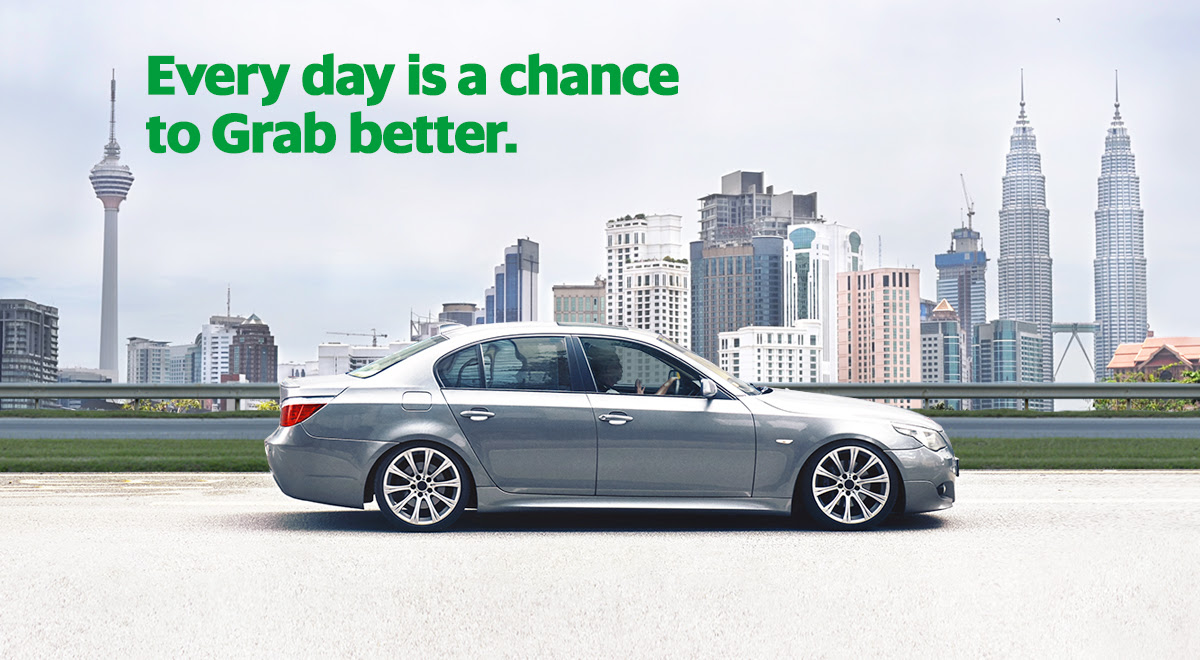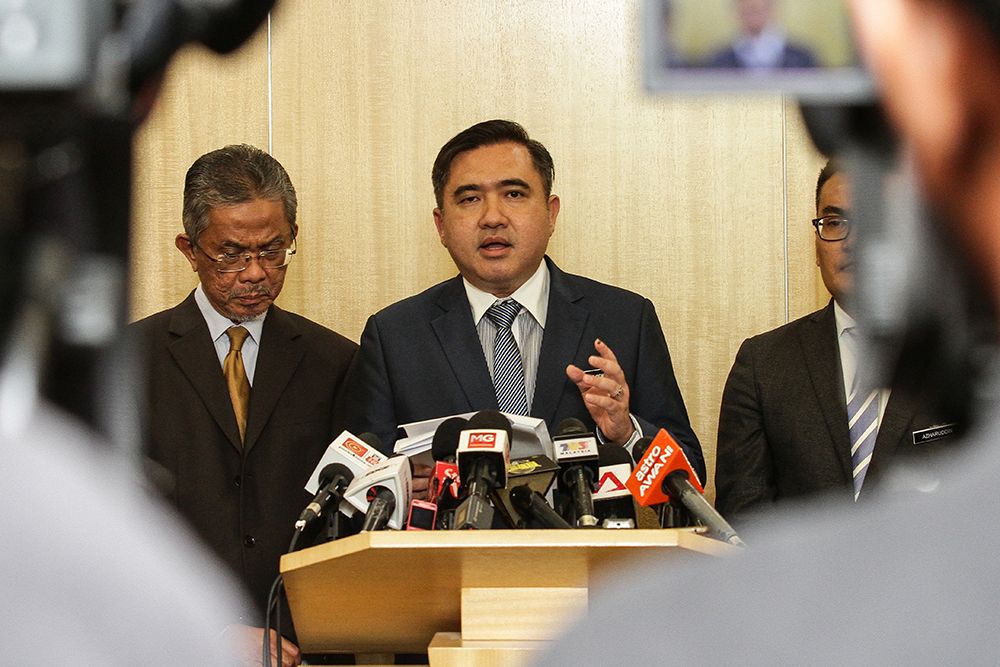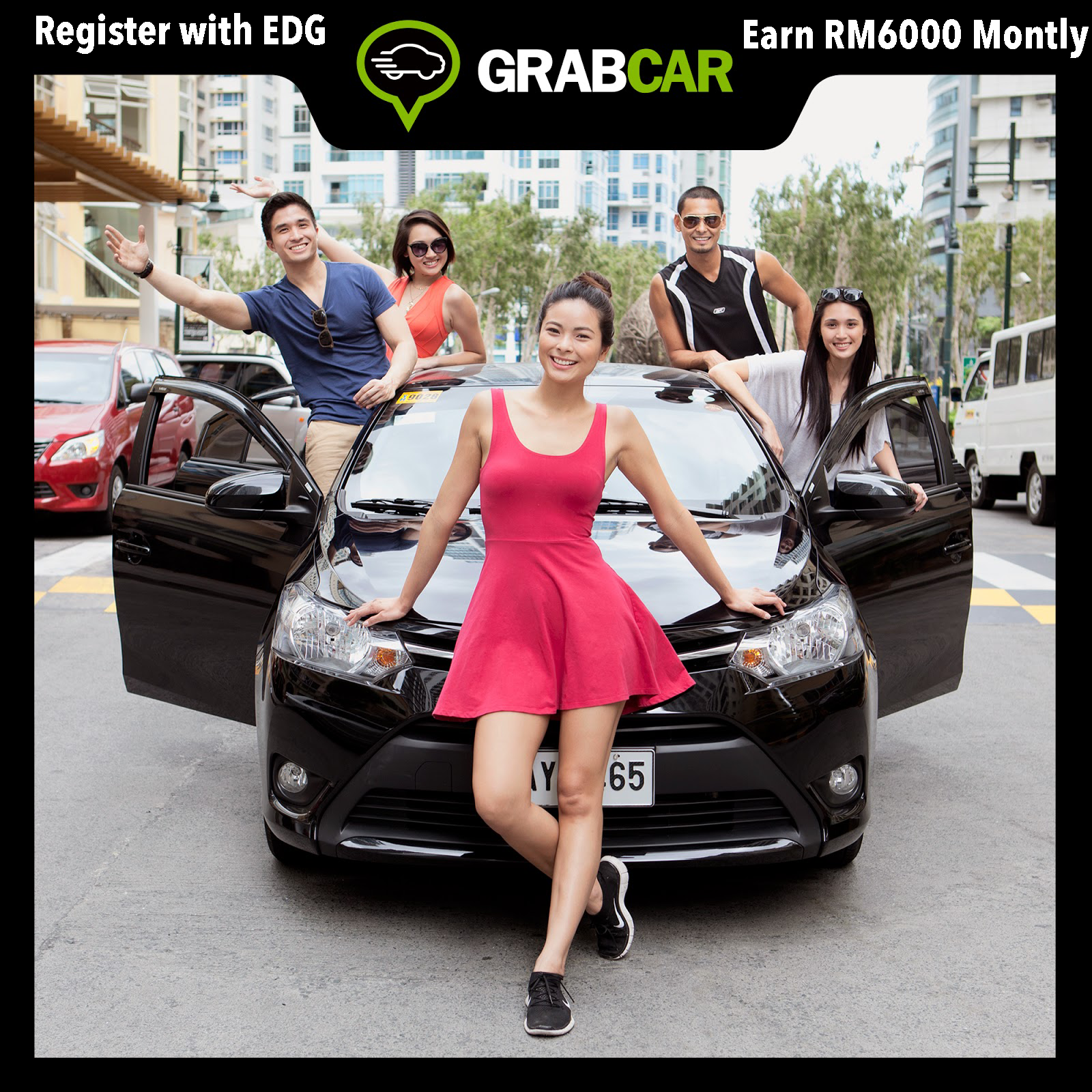iMoney ![]() Jun 16, 2016 16:02 MYT
Jun 16, 2016 16:02 MYT
“I love to spend some me-time on the road while being stuck in traffic,” said no one ever.
Based on a recent survey by GlobalWebIndex, 55% of the 1,050 Malaysians polled, said they spend more time in traffic congestions compared to last year.
This makes any convenient, safe and affordable public transportation a boon for Malaysians, because no one wants to be behind the wheel, bumper-to-bumper, every single day. So, what better way to earn some cash offering a service that most Malaysians need?
With Uber and Grab launched in Malaysia in recent years, Malaysians can now make use of these platforms to earn some extra cash.
You need not quit your job to work as Uber or GrabCar drivers, however, with limited time on your hand, you will need to figure out which company pays you more for your time.
Which has higher fare rates & commission
Here’s a comparison of the fare rates and commission for UberX and GrabCar Economy:
Economy |
||
| Commission | ||
| Base Fare | ||
| Per KM Rate | ||
| Per Minute Rate |
Based on the basic fare structure above, without per minute rate, GrabCar will be more profitable when the traffic is smooth (read: non-peak hours). However, that is rarely the case in the Klang Valley, hence UberX may be a better platform to earn more when you are chauffeuring passengers around in slow and heavy traffic.
Another significant difference between the two platforms are, during peak hours Uber practises price surging. This happens when many people are trying to request a ride at the same time and the fares surge for a typical duration of a few minutes.
Uber drivers may be able to earn more if they drive during peak hours, where fare surging is common. However, Uber also charges higher commission at 25%, while GrabCar’s commission is only 20%.
How much can you earn based on the same distance and duration of trip for both UberX and GrabCar Economy?
Here’s the breakdown for a trip between 1 Utama Shopping Centre and KL Sentral. The distance via LDP and SPRINT Highway is 14.3km.
| Base fare | ||
| Per KM rate | = RM8.58 |
= RM18.59 |
| Per minute rate | = RM5.25 |
|
| Total earnings before commission | = RM14.78 |
= RM19.59 |
| Total earnings after commission | = RM11.09 |
= RM15.67 |
| Base fare | ||
| Per KM rate | = RM8.58 |
= RM18.59 |
| Per minute rate | = RM10.00 |
|
| Total earnings before commission | RM0.95 + RM8.58 + RM10.00 = RM19.53With price surge (1.5x) RM19.53 x 1.5 = RM29.30 |
= RM19.59 |
| Total earnings after commission | RM19.53 – 25% = RM14.65With price surge (1.5x) RM29.30 – 25% = RM21.97 |
= RM15.67 |
GrabCar offers a flat rate fare, regardless of traffic condition. The fare is shown on the app, and the calculation above serves as a guideline only.
Based on the simple calculations above, GrabCar is definitely better if the time you can commit to driving for them is during non-peak hours, and traffic is smooth. However, if you are working regular 9-to-5 job, you will most likely be able to drive in the morning and evening rush hours.
If that is the case then Uber is clearly the winner.
How about drivers’ incentives?
Drivers for both Uber and GrabCar do not just earn the fares minus commissions. These companies also offer incentives to their drivers, and these incentives are really where the money is.
The incentives can be quite complicated and will require you to carefully strategise your working hours to earn the most bucks.
UberX Tier 1 Incentive
Source: Uber Malaysia
The above is the Tier 1 incentives for UberX drivers, as of May 2016. As you can see, the incentives differ for different hours, with the morning rush hour having the highest incentive per hour at RM30 per hour.
Now, let’s have a look at what GrabCar is offering:
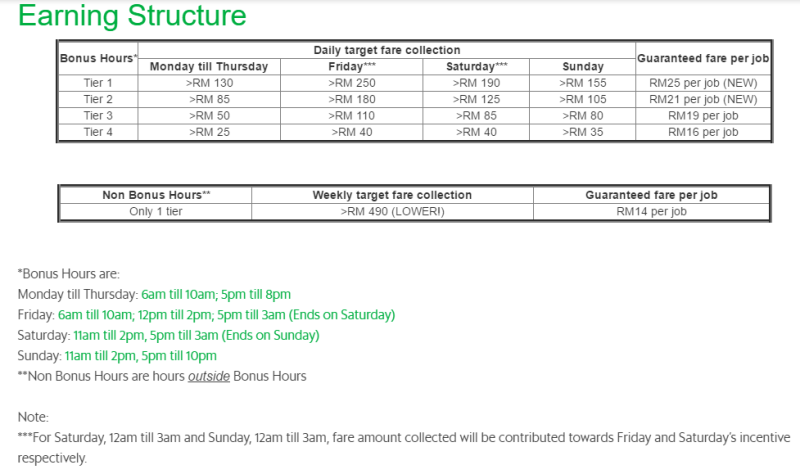
Source: GrabCar Economy Malaysia
To be eligible for incentive for both platforms, drivers must fulfil the following set of criteria:
| Minimum fare weekly to be eligible for Tier 1 |
||
| Trip acceptance rate |
||
| Average driver rating |
||
| Driver cancellation rate |
||
| Trip completion rate |
hours jobs in a week in busy areas. |
|
| Locations applicable |
at Core Service Areas are Mont Kiara, PJ, Golden Triangle and more. |
Valley (except Cyberjaya) |
GrabCar Economy also has additional terms such as driver cancellation rate not more than 12%. However, bookings cancelled by passengers will not affect weekly driver cancellation rate. The trips calculated for incentive is only based on the weekly unique passenger count.
Yes, there seems to be quite a lot of terms and conditions to contend to for both Uber and GrabCar. The clear difference we can see is UberX incentivise by the hour, while GrabCar Economy goes by the trip/job.
Now, let’s take a look at how these incentives mean to your earnings by focusing on the meatiest chunk of the day – morning rush hour. Due to the higher minimum fare required by GrabCar, we are comparing Tier 2 incentive rate with Uber’s Tier 1 rate:
| Hours | 6am – 10am |
6am – 10am |
| Rate | Tier 4 (Fri): RM16/trip |
|
| Total no. of trips per day | = 6 trips |
= 6 trips |
| Total earnings from fare per day |
= RM84.60 |
= RM90 |
| Total incentive per day | 4 hours x RM30 = RM120Net incentive: (RM120 – RM84.60) – 25% = RM26.55 |
Mon – Thu: 6 trips x RM21 = RM126 Fri: 6 trips x RM16 = RM96Net incentive: Mon – Thu: RM126 – RM90 = RM36 Fri: RM96 – RM90 = RM4 |
| Total earnings from fare per month |
= RM1,692 |
= RM1,800 |
| Total incentive per month | = RM531 |
= RM432 Fri: RM4 x 4 days^ RM16Total RM432 + RM16 = RM448 |
| Additional incentive | RM50 extra at 25 trips Total = RM150 |
|
| Total income per month | = RM2,373 |
* Assuming earning per trip at RM18.80 (before deduction of commission).
^ Based on this example, GrabCar driver will only be eligible for Tier 4 incentive for Friday.
As Uber practises price surging when demand is high, let’s assume that an average price surge 1.3x applies every Monday to Friday, between 6am to 10am. An Uber driver can potentially earn an additional RM508 (RM1,692 x 1.3 = RM2,200)!
GrabCar, on the other hand, does not have price surging, and only charges a flat rate, regardless of the traffic condition or the demand. Without the price surging for both companies, GrabCar’s earnings top Uber’s by about 3.3%.
Based on our example above, the GrabCar driver will only be eligible for Tier 4 incentive for Friday because a driver needs to earn at least RM180 in fare to qualify for GrabCar’s Tier 2 incentive.
However, GrabCar allows more hours on Friday to hit the higher target. You will need to put in more hours on Friday and the weekend to make up for the fare target on Friday. If you make additional six trips (12 trips in a day) on Friday, you will be looking at getting an additional 28% of incentive for GrabCar, while UberX with the additional hours only get you an additional 3.5%:
| Total monthly earnings for Mon – Thu | ||
| Total earnings per Friday | = RM169.20 |
= RM180 |
| Total incentive per Friday | (12/1.5 trips) = 8 hoursGross incentive: 4 hours x RM30# = RM120 4 hours x RM12^ = RM48 Total = RM168As the total gross incentive is lower than the earnings, there will be no top-up to the total earnings.
|
= RM252Total incentive RM252 – RM180 RM72 |
| Total earnings per month | = RM2,455.20 |
Fridays: (RM180 + RM72) x 4 Fridays =RM1,008Total earnings = RM1,008 + RM1,872 = RM2,880 |
* Assuming earning per trip at RM18.80 (before deduction of commission).
# Assuming the first 4 hours for UberX to be between 6am to 10am with hourly guarantees of RM30 per hour.
^ Assuming the remaining 2 hours for UberX to be between 9pm to 1am with hourly guarantees of RM12 per hour.
Another stark difference between GrabCar and Uber is, Uber incentivise its drivers based on hours, while GrabCar incentivise based on unique trips. Uber also deducts the 25% commission from the incentive, making the incentive significantly lower. Both these points make GrabCar’s incentive more attractive. To make the most out of the incentive structure, GrabCar drivers can pick up more short trips to make more incentive.
The other factors
iMoney has always advocated value. The same goes to your side-income gig.
If by earning an additional RM50 you get more headaches, it’s simply not worth your trouble. Therefore, instead of just evaluating the money you can potentially earn, you should also consider the other factors that come with driving people around with both Uber and Grab.
Passenger rating
Sometimes we meet bad drivers, while other times we meet terrible passengers. This goes both ways, and Uber recognises this. To protect its drivers, the app allows both passengers and drivers to rate each other.
Grab, on the other hand, only allows passengers to rate the drivers. Uber drivers can view the rating of a passenger before deciding to accept the job.
Destinations
One downside to Uber is, its drivers are unable to view the destination before accepting a job. This makes it hard for drivers to plan their trips and earnings when they are online.
Unlike Uber, Grab gives you the destination of your passenger, so you will be able to gauge the estimated fares, and also avoid destinations that you are uncomfortable going to. This can give you a clearer idea on the driving strategy.
With today’s high cost of living, every Ringgit counts. To keep up with a comfortable lifestyle, you may need a source of extra income, and driving for Uber and Grab may be your answer to that.
Other than analysing the earnings schedule and rates, it also pays to balance whether the earnings will cover all your petrol and car maintenance cost at the end of the day.
Fares and incentives for both platforms change periodically, and you may need to reconsider which platform to drive for in order to make the most of your time.
If you’ve been or still an Uber or Grab driver, let us know if this is a worthwhile side-income gig in the comment section below!
This article is contributed by iMoney.my, Malaysia’s leading financial comparison website. To compare and apply for the best financial products, such as credit card, home loans and personal loans, visit www.iMoney.my
